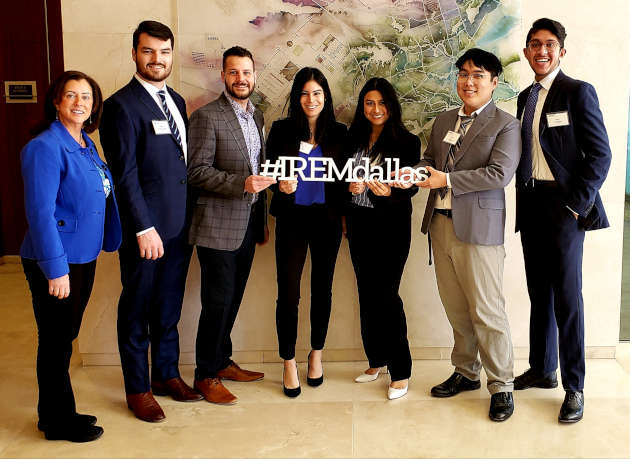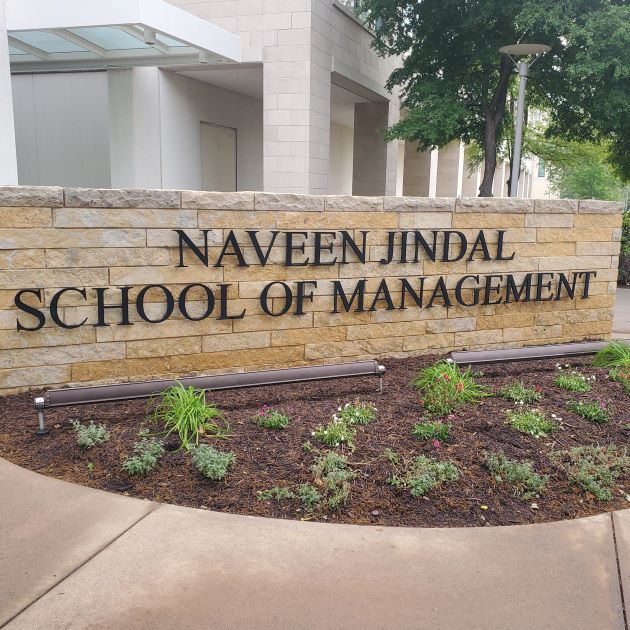A team of Naveen Jindal School of Management undergraduate students recently overcame myriad challenges stemming from the COVID-19 pandemic to win the Institute of Real Estate Management 2020 College Case Competition.
Presented by the Dallas chapter of the institute, the competition pitted the UT Dallas team against the defending champions from the University of North Texas. The JSOM students brought home the win and $5,000.

The Jindal School team included:
- Jacob Sandler (team captain), BS in Finance 2020
- Cameron Lundberg, BS in Business Administration 2020
- Sameer Ahmed, a senior in finance and an electrical and electronics engineering double major
- Gabby Hernandez, a senior in finance
- Isis Vidal, a junior in global business
- Henry Zhang. a junior in finance.
Dr. Randall S. Guttery, a clinical professor in the Jindal School’s Finance and Managerial Economics Area and director of both the Real Estate Concentration and the Herbert D. Weitzman Institute for Real Estate, served as the team’s faculty advisor and sponsor.
Julie Lynch, an associate professor of practice in the Finance and Managerial Economics Area, developed the competition for IREM-Dallas and wrote the competition cases this year and last year.
To win, team members were able to draw upon lessons they learned in Real Estate Principles (REAL 3305) and Real Estate Valuation (REAL 4328).
IREM is an international professional organization for commercial and residential real estate managers. IREM -Dallas created the competition to provide an educational opportunity for student competitors, introduce them to careers in commercial property management and get them involved in the organization.
When the competition kicked off Feb. 29, the students met with IREM-Dallas Executive Board members and two IREM member coaches.
“What really differentiates this competition from others that I have seen is [that] the students have an opportunity to build rapport and a relationship with their IREM member coaches and the executive board,” Guttery said. “It also gives them the support they need to take on a challenge for which they might not have much experience.”
Maximizing an ’80s Retail Center’s Value
The case this year involved a strip center in Denton, Texas, that was built in the 1980s. Competitors were tasked with finding a way to drive consumer traffic to increase tenants’ retail sales and maximize the center’s value, Lynch said.
“The challenge was that many of the tenants were not hitting their targeted sales numbers,” she said. “The concern was that when lease renewals came around, they wouldn’t renew their leases.”
The students spent 100-plus hours meeting with their coaches and one another, performing real estate and consumer market analyses and developing a financial analysis. They also performed an extensive property tour and site analysis.
Showing Initiative From the Outset
Part of the agenda on competition kickoff day was to visit the Denton strip center. On their way, the JSOM students put in the center’s coordinates but discovered that the directions were not correct. This, Lynch said, could have a negative effect on the tenants’ retail sales. The students immediately contacted Google and had the coordinates changed.
“They didn’t just make a recommendation to the owner,” she said. “They rectified the situation right away.”
This show of initiative, along with actionable recommendations the students made in their April 8 presentation to IREM judges, put them over the top.
Factoring in the Pandemic
Originally, “we wanted to propose a health and wellness center, and make it more of a lifestyle location with medical offices, fitness studios with yoga and spinning and smoothie coffee and tea shops — make it a place where people wanted to hang out and spend their day,” Sandler, the team captain, said.
But after a Dallas County COVID-19 shelter-in-place order took effect March 22 and organizers took the competition online, students had to adapt to market timing. In particular, they had to consider what the effects of the pandemic were going to be on real estate, people and the demographics of the area, Sandler said.
Their original ideas, which would have fit Denton’s demographics very well, Sandler said, were put on hold. The team turned instead to businesses that could do well during a recession or pandemic, businesses such as grocery stores and delivery services.
“Our idea was to reduce the personal interaction but provide an amenity that other locations might not have — while being safe,” he said.
The JSOM team’s ability to quickly change plans made an impression on the judging panel, which included Susan Heath, vice president of real estate services company Lincoln Harris CSG and past president of IREM-Dallas.
“Students often have creative ideas, but this one was financially feasible,” Heath said.
Sandler was thankful for the opportunity to work on a case that had real-world implications.
Skills, Strategy and Mentors Outside the Classroom
“In the classroom, even in the best case courses, the data has already been collected, and the outcome has already happened,” he said. “It’s still relevant, but you can already see the outcome; whereas in this competition, we acted more or less as consultants. We were given a problem and were asked for a solution. They gave us guidelines but, beyond that, it was open for interpretation. Whatever we came up with could be the solution they actually use.”
“This win really speaks to the quality of our students and the quality of the real estate offerings at the Jindal School,” Guttery said. “Our outstanding faculty members, with more than 175 years combined experience, are dedicated to advancing our students’ careers.”
“This competition taught me skills and strategy and gave me access to mentors that I know are going to be available beyond the competition,” said Sandler, who is planning a career as a real estate appraiser. “These experiences teach us that real estate is all about sales. It’s about learning how to pitch so that you get the customer’s interest and get them inclined to hear the rest of the story.”
Team members, Jacob said, came from different majors and backgrounds, so each was able to offer a different perspective toward solving the problem.
“It was interesting how each person had something to contribute,” he said. “Each person added value to the team that the other people wouldn’t have been able to bring.”





